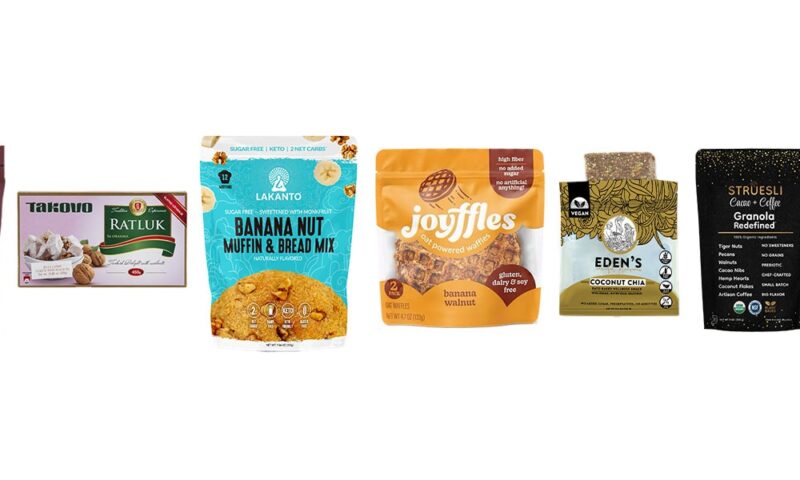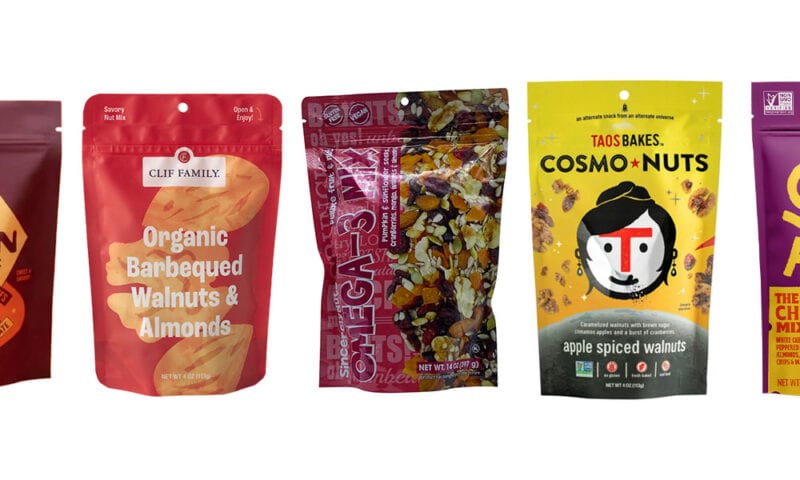Why California Walnuts?
A white paper from the California Walnut Commission
For thousands of years, walnuts have possessed many unique qualities. Today, those distinct attributes are being harnessed and celebrated in new and exciting ways. With more and more “made with walnuts” foods and beverages hitting store shelves, the value of walnuts’ flavor, versatility, and nutritional benefits is making a direct impact on innovation across several product categories.
California walnuts are a plant-based, whole food that contribute many beneficial nutrients and value consumers recognize and appreciate. They are also an ideal ingredient for food and beverage manufacturers looking to deliver new creative products without sacrificing flavor, texture, or nutrition.
The California Walnut Commission developed this white paper for product developers and marketers to gain insight as to what makes walnuts unique. If you have any questions or would like more information, please contact kseiz@walnuts.org.
#1 Walnuts are an Excellent Source of Omega-3 Alpha-Linolenic Acid (ALA)
Are you looking to give your product a boost of good fats without the fish oil? Consider formulating with walnuts, the only nut to contain a significant amount of plant-based omega-3 alpha-linolenic acid (ALA) at 2.5 grams per ounce or 9 grams per 100 grams.
Omega-3 ALA may help with reducing the risk of heart diseases and inflammation1. Overall, omega-3 ALA is classified as an essential fatty acid, meaning the body must get it through external food sources, such as canola oil, flaxseed oil or — of course — walnuts. If you are looking to give your product a boost of plant-based omega-3 ALA, walnuts are a great nut to include in your product formula.
Here are some examples:
OH! MEGA Trail Mix
Lehi Valley Trading Company
This snack company has found a way to bring nutrition to a delicious trail mix that’s perfect for healthy or convenient snacking occasions. Lehi Valley’s OH! MEGA Trail Mix incorporates walnuts, which provide an excellent source of omega-3 ALA (2.5g/oz), in a nut-and-seed mix that also includes pumpkin seeds, mango, and cranberries.
Keto Cookie Bites
Fearless Keto
Launched in early 2020, Keto Cookie Bites use California walnut flour to provide a boost of all-important plant-based omega-3 ALA (2.5g/oz) The products are formulated to satisfy the keto diet and contain 3 grams of protein and 1 gram of net carbs per serving.
#2 Plant-Based Functionality
There’s no denying the booming popularity of plant-based foods. However, consumers are starting to doubt the ingredients in some popular meat alternatives on the marketplace. Does the average consumer know what leghemoglobin is? Does methylcellulose belong on a clean label plant-based food?
With walnuts, plant-based food and beverage manufacturers can mimic products such as ground beef without excess ingredients and fillers. The next generation of plant-based foods will focus on clean label products, and walnuts can play a starring role due to their subtle nuttiness and exceptional texture that mimics ground beef in tacos, hamburgers, and even frozen ravioli.
Here are some examples:
California Veggie Burger
Amy’s Kitchen
This made-with-walnuts California Veggie Burger is a plant-based patty that includes toasted walnuts mixed with mushrooms, onions, celery, carrots, oats, garlic, and potatoes. One patty contains 6 grams of protein and 4 grams of dietary fiber.
Meaty Walnut Ravioli
Eat Nice
As the popularity of plant-based foods continues to grow, food manufacturers are taking meat alternatives to a whole new level. Eat Nice’s newest product, Meaty Walnut Ravioli, combines sundried tomatoes with walnuts to offer a perfectly textured vegan meat substitute.
#3 Flavor Versatility
From a flavor perspective, walnuts carry a unique and subtle nutty flavor profile. They complement both sweet chocolate, vanilla, and fruit applications, as well as savory meat, vegetable, and pasta applications. Walnuts possess a fairly mild flavor, but they also have a complex profile that includes tangy, acidic, buttery, and sharp notes.
Walnuts are quite versatile and pair well with many ingredients, but some flavors can really help a product developer achieve that “wow” factor. The dual nature of the walnut — its sharp-flavored skins and a rich interior — enables it to play two roles in the pairing game. The bitter notes allow walnuts to combine with sweeter and higher-fat foods, but at the same time lighten up citrus fruit flavors and vegetables. Recognizing and capitalizing on these flavor dimensions is the key to your walnut development success.
Here are some examples:
Grain Free Granola Dark Chocolate Strawberry
Wildway
The company’s promise of “100% Real-Food Ingredients” is delivered through organic dates, walnuts, sunflower seeds, pumpkin seeds, cashews, pecans, dried strawberries, organic cacao powder, sea salt, and vanilla bean. The grain-free granola is gluten-free and vegan.
Reishi Walnut Chocolate Bar
Vosges Chocolate
Mushrooms and chocolate? Vosges’ latest offering uses roasted walnuts to provide flavor versatility, texture, and familiarity to a product that contains reishi mushrooms and bittersweet 72% cacao dark chocolate.
In a 2019 consumer survey, taste was cited as the number one reason consumers eat walnuts.
#4 Texture
Walnuts have the perfect bite. Neither too hard nor too soft, they are the ideal inclusion in everything from ice cream to snack bars to plant-based taco crumbles. With walnuts available in sizes ranging from whole pieces to walnut meal, food manufacturers have the ability to tailor the perfect mouthfeel in products using walnuts. Plus, walnuts’ pliable texture makes them a great medium for seasonings.
Here are some examples:
Banana Walnut Energy and Protein Bar
Trailnuggets Pro
This “energy” and protein product puts a unique spin on the popular bar format with an inclusion of a walnut butter filling. The bars are vegan, gluten-free, dairy-free, soy-free, and include plant-based protein and good fats to maintain satiety throughout the day.
Walnut Morsels
Fairytale Brownies
These individually-wrapped bite-size brownies are topped with California walnuts, guaranteeing the perfect bite, every time.
#5 Nutritious Indulgence
Ten years ago, consumers accepted that eating “healthy” packaged foods often meant sacrificing taste. Those days are over. Consumers demand products that are all-natural, taste great, and deliver on nutrition. Healthful indulgence has become the holy grail of food and beverage product development. Manufacturers in almost every category are trying to create great-tasting products loaded with nutritional benefits.
Walnuts deliver both essential nutrition and indulgence, and are easily incorporated into countless food products. In a 2019 consumer survey, taste was cited as the number one reason for consuming walnuts. In addition, 90% of consumers recognize walnuts as a nutritious food and 78% said the health benefits of walnuts positively impacted their purchase decision.
There is a wealth of research showing the benefits of walnuts beyond their significant source of omega-3 ALA fatty acid (2.5g/oz). This research spans from weight management to heart health to cognition. Some key studies include:
- A study from Harvard University found that increasing daily nut consumption was associated with less long-term weight gain and a lower risk of obesity in adults. An increase in consumption of walnuts and other tree nuts by half a serving (14g or 1/2oz) per day was associated with a 15% and 11% lower risk of developing obesity2.
- A study published in the American Journal of Clinical Nutrition examined 25 years of evidence for the positive role of walnut consumption on cardiovascular risk factors, including cholesterol, triglycerides, blood pressure, and weight3. Due to the scientific evidence on walnuts and heart health, walnuts are certified as a heart-healthy4 food by the American Heart Association.
- An animal study published in the Journal of Alzheimer’s Disease found that a diet including walnuts may play a role in reducing the risk of Alzheimer’s disease5. Researchers examined the effects of dietary supplementation with 6% or 9% walnuts in mice (equivalent to 1 ounce and 1.5 ounces of walnuts per day in humans) compared to a control diet with no walnuts. The study found significant improvement in learning ability, memory, reducing anxiety, and motor development in mice fed a walnut-enriched diet.
Findings from these walnut studies are encouraging, but they do not prove cause and effect. Other lifestyle habits, which are more common in adults who eat walnuts, could have influenced the results and cannot be ruled out. This is particularly important in animal studies as they provide background and are used to formulate hypotheses for additional research needed to determine the effects on humans.
Walnuts have the unique ability to allow product developers to create indulgent products with nutrition properties.
Here are some examples:
Keto Cups Walnut Fudge Brownie
Duncan Hines
If you’re looking for nutritious indulgence in a cup, look no further than Duncan Hines’ Walnut Fudge Brownie. The products were formulated for followers of the keto diet who still want a sweet treat such as a walnut fudge brownie.
Apple Pie Bar
Larabar
With only six ingredients, this delicious bar gives consumers the taste of apple pie in a dairy-free, vegan, soy-free, and gluten-free format. The bar contains a half cup of fruit mixed with walnuts, cinnamon, and raisins.
References
1. Fleming JA, Kris-Etherton PM. The Evidence for Alpha-Linolenic Acid and Cardiovascular Disease Benefits: Comparisons with Eicosapentaenoic Acid and Docosahexaenoic Acid. Adv. Nutr. 2014; 5: 1-14.
2. Liu X, Li Y, Guasch-Ferré M, et al. Changes in nut consumption influence long-term weight change in U.S. men and women. BMJ Nutr Prev Health. 2019;2:doi: 10.1136/bmjnph-2019-000034.
3. Guasch-Ferré M, Li J, Hu FB, et al. Effects of walnut consumption on blood lipids and other cardiovascular risk factors: an updated meta-analysis and systematic review of controlled trials. Am J Clin Nutr. 2018;108(1):174-187. doi: 10.1093/ajcn/nqy091.
4. Supportive but not conclusive research shows that eating 1.5 ounces of walnuts per day, as part of a low saturated fat and low cholesterol diet (and not resulting in increased caloric intake,) may reduce the risk of coronary heart disease. (FDA) One ounce of walnuts offers 18g of total fat, 2.5g of monounsaturated fat, 13g of polyunsaturated fat, and includes 2.5g of alpha-linolenic acid – the plant-based omega-3.
5. Muthaiyah B, Essa MM, Lee M, Chauhan V, Kaur K, Chauhan A. Dietary supplementation of walnuts improves memory deficits and learning skills in transgenic mouse model of Alzheimer’s disease. J Alzheimers Dis. 2014;42(4):1397–1405. doi:10.3233/JAD-140675



